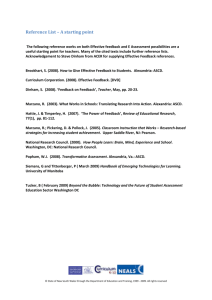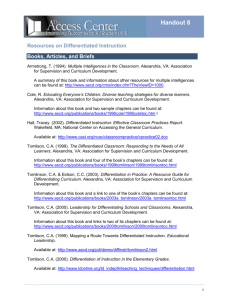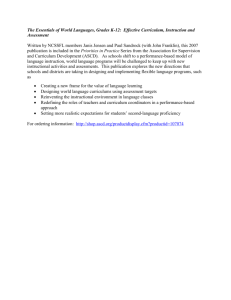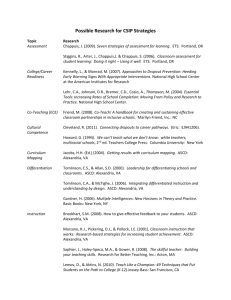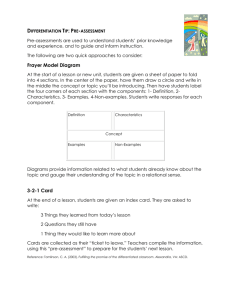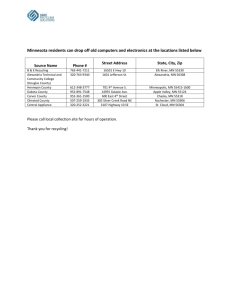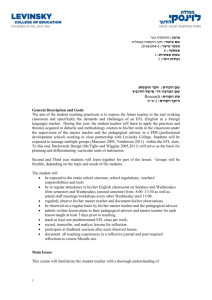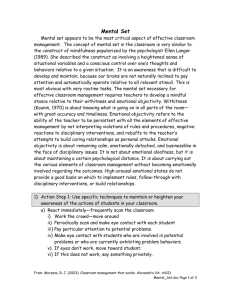EDSU 605 Principles of Supervision Western Carolina University
advertisement
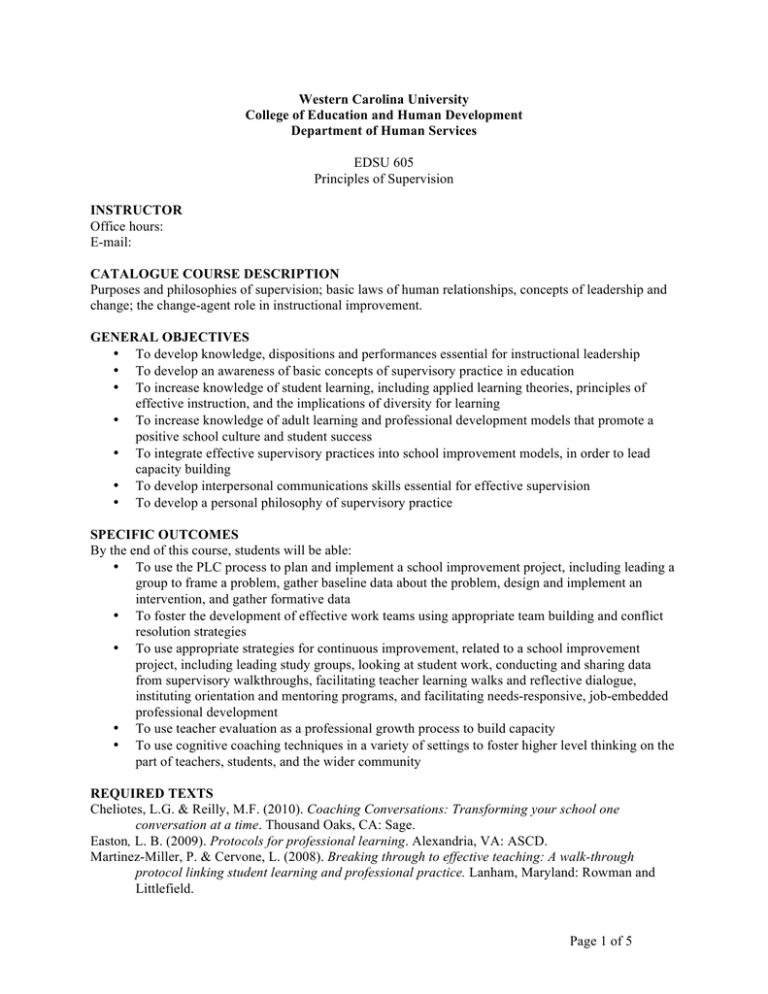
Western Carolina University College of Education and Human Development Department of Human Services EDSU 605 Principles of Supervision INSTRUCTOR Office hours: E-mail: CATALOGUE COURSE DESCRIPTION Purposes and philosophies of supervision; basic laws of human relationships, concepts of leadership and change; the change-agent role in instructional improvement. GENERAL OBJECTIVES • To develop knowledge, dispositions and performances essential for instructional leadership • To develop an awareness of basic concepts of supervisory practice in education • To increase knowledge of student learning, including applied learning theories, principles of effective instruction, and the implications of diversity for learning • To increase knowledge of adult learning and professional development models that promote a positive school culture and student success • To integrate effective supervisory practices into school improvement models, in order to lead capacity building • To develop interpersonal communications skills essential for effective supervision • To develop a personal philosophy of supervisory practice SPECIFIC OUTCOMES By the end of this course, students will be able: • To use the PLC process to plan and implement a school improvement project, including leading a group to frame a problem, gather baseline data about the problem, design and implement an intervention, and gather formative data • To foster the development of effective work teams using appropriate team building and conflict resolution strategies • To use appropriate strategies for continuous improvement, related to a school improvement project, including leading study groups, looking at student work, conducting and sharing data from supervisory walkthroughs, facilitating teacher learning walks and reflective dialogue, instituting orientation and mentoring programs, and facilitating needs-responsive, job-embedded professional development • To use teacher evaluation as a professional growth process to build capacity • To use cognitive coaching techniques in a variety of settings to foster higher level thinking on the part of teachers, students, and the wider community REQUIRED TEXTS Cheliotes, L.G. & Reilly, M.F. (2010). Coaching Conversations: Transforming your school one conversation at a time. Thousand Oaks, CA: Sage. Easton, L. B. (2009). Protocols for professional learning. Alexandria, VA: ASCD. Martinez-Miller, P. & Cervone, L. (2008). Breaking through to effective teaching: A walk-through protocol linking student learning and professional practice. Lanham, Maryland: Rowman and Littlefield. Page 1 of 5 Marzano, R. J. (2003). What works in schools: Translating research into action. Alexandria, VA: ASCD. (You should have this book from a previous class.) Roberts, S. M. & Pruitt, E. Z. (2003). Schools as professional learning communities: Collaborative activities and strategies for professional development. Thousand Oaks, CA: Sage. In addition, you are responsible for using APA style in all papers prepared for this and other MSA classes. Information about purchasing Concise Rules of APA Style are found at: http://books.apa.org/books.cfm?id=4210000 You may also access APA style on a variety of web sites. Additional Reading will be distributed in class or via the Blackboard course shell. Schedule of Topics (Note: This schedule may be adjusted, depending on student needs.) Module A B C D E Break F Topics Overview of Course Establishing norms for a learning community What is supervision? What is the role of a supervisor? Supervision that Promotes Collaboration: Building Professional Community Establishing norms for a PLC Learning through Job Embedded Professional Development Learning through Teamwork Learning through Study Groups Application: Study Group on Best Practices in Instruction Instructional Practices that Work Formative Assessment Classroom Management Learning through Observation and Reflection Looking at Student Work Supervisory Walkthroughs Teacher Learning Walks Cognitive Coaching and other supervisory skills for facilitating collaborative learning Break Complete supervisory walkthroughs and teacher learning walks Work on group presentations on School Improvement Project and PLC strategies Develop orientation and mentoring plan Application Reports on supervisory walkthroughs and Teacher Page 2 of 5 G H Learning Walks Presentations on orientation and mentoring plans Leading Individual Learning Formative Teacher Observation, Coaching, Evaluation Synthesis, reflection, goal setting, evaluation Class Attendance and Participation Because this class is designed to model a “community of learners” similar to the culture you will be expected to develop in a school, it is essential that you attend all classes and participate actively with your colleagues. Your attendance for the full class period is expected, and you are responsible for everything that is covered, distributed, or announced during class. If an absence is unavoidable, you should arrange with a classmate to receive handouts and announcements. Students with two or more absences are unlikely to earn a grade higher than B. CRITERIA FOR EVALUATION Your grade in this course is based on the following: Participation 40% Participation includes active participation in small and large group discussions and completing all assigned preparatory tasks. You will complete a self-assessment of your participation as well as an assessment of your colleagues. I will also assess your participation in online discussions. Projects 40% The competency “written expression” is essential in promoting strong home/school relations, building a sense of trust, promoting a positive image of the professional and the school and putting into operation the competencies of organizational oversight and implementation skills, among others. Therefore, all projects will be read for grammar, spelling, proofing and format. The content of the project must reflect management and leadership skills gained through a combination of two or more categories of sources such as reading, research, class and small group discussion and mentor collaborations. Citations must be included in the final products. Please use APA style, accessible on line. Individual Reflections 20% Inquiry, reflection, observation and analysis are all integral components of the University’s conceptual framework for initial licensure programs. Further, it is the reflective process that assists the students in synthesizing knowledge and practice. Most importantly, instructional leaders must possess the skills to guide reflective dialogue among the members of the professional school community. Therefore, you will not only engage in individual reflection, but also you will participate in and lead reflective discussions. Guides for reflection will be provided. Total points possible will be included with each assignment and will be indicated in the online Gradebook. Grading scale is: 91%-100%=A 81%-90%=B 71%-80%=C Below 71%=F CONCEPTUAL FRAMEWORK STATEMENT The professional education program at Western Carolina University fulfills its mission by creating and nourishing a community of learners guided by knowledge, values, and experiences. The guiding Page 3 of 5 principles of this community include the belief that the best educational decisions are made after adequate reflection and with careful consideration of the interests, experiences, and welfare of the persons affected by the decisions; appreciation of and respect for diversity; and the fostering of the responsible use of technology. This course promotes the development of leadership for professional learning communities. Specific decision making models and skills are a major focus and students reflect verbally and in writing on those decisions. The needs of diverse learners as related to student achievement are an important part of the curriculum. Students are invited and encouraged to think about who they are as leaders, what experiences have shaped them and what they value about education and leadership. DIVERSITY STATEMENT Students explore the role of the educational leader in providing leadership in school to create climates and instructional strategies to meet the needs of diverse learners. POLICY ON ACADEMIC HONESTY Honesty is expected. The STRICTEST university policy shall be followed in cases of any form of academic honesty. (See The Record and the Student Handbook for specific details at http://www.wcu.edu/studenthomepage/handbook) Academic dishonesty includes: A. Cheating—Intentionally using or attempting t use unauthorized materials, information, or study aids in any academic exercise. B. Fabrication—Intentional falsification of information or citation in an academic exercise. C. Plagiarism—Intentionally or knowingly representing the words or ideas of someone else as one’s own in an academic exercise. D. Facilitation of Academic Dishonesty—Intentionally or knowingly helping or attempting to help someone else to commit an act of academic dishonesty, such as knowingly allowing another to copy information during an examination or other academic exercise. Using a paper or project from another class or student is unacceptable. ACCOMMODATIONS FOR STUDENTS WITH DISABILITIES Western Carolina University is committed to providing equal educational opportunities for students with documented disabilities. Students who require disability services or reasonable accommodations must identify themselves as having a disability and provide current diagnostic documentation to Disability Services. All information is confidential. Please contact: (828) 227-7234 for more information. SELECTED BIBLIOGRAPHY Instruction Hill, J. D., & Flynn, K. M. (2006). Classroom instruction that works with English language learners. Alexandria, VA: ASCD. Marzano, R. J., Pickering, D. J., & Pollock, J. E. (2001). Classroom instruction that works: Researchbased strategies for increasing student achievement. Alexandria: ASCD. Tomlinson, C. A. (1999). The differentiated classroom: Responding to the needs of all learners. Alexandria: ASCD. Tomlinson, C. A. & McTighe, J. (2006). Integrating Differentiated Instruction & Understanding by Design: Connecting content and kids. Alexandria: ASCD. Professional Development Sparks, D. & Hirsh, S. (1997). A new vision for staff development. Alexandria,VA: Association for Supervision and Curriculum Development. Page 4 of 5 School Improvement Reeves, D. B. (2006).The learning leader: How to focus school improvement for better results. Alexandria, VA: ASCD. Marzano, R. J. (2003). What works in schools: Translating research into action. Alexandria, VA: ASCD. Reeves, D. B. (2004). Accountability for learning: How teachers and school leaders can take charge. Alexandria, VA: ASCD. Schmoker, M. (1999). Results: The key to continuous school improvement (2nd ed.) Alexandria, VA.: Association for Supervision and Curriculum Development. Schmoker, M. (2001). The results fieldbook: Practical strategies from dramatically improved schools. Alexandria, VA: Association for Supervision and Curriculum Development. Supervision and Evaluation Coppola, A. J., Scricca, D. B., & Connors, G. E. (2004). Supportive supervision: Becoming a teacher of teachers. Thousand Oaks, CA: Corwin. Danielson, C. (1996). Enhancing professional practice: A framework for teaching. Alexandria: ASCD. Danielson, C. & McGreal, T. L. (2000). Teacher evaluation to enhance professional practice. Alexandria, VA: ASCD. Glickman, C. D., Gordon, S. P., & Ross-Gordon, J. M. (2004). SuperVision and instructional leadership: A developmental approach (6th ed.). Boston: Allyn and Bacon. Jorissen, K. T. (2006). Three skillful moves to assessment for the busy principal. Journal of Staff Development, 27(1), 22-30. Stronge, J. H. (2002). Qualities of effective teachers. Alexandria: ASCD. Zepeda, S. J. (2005). The instructional leader’s guide to informal classroom observations. Larchmont, NY: Eye on Education. Zepeda, S. J. (2003). Instructional supervision: Applying tools and concepts. Larchmont, N. Y.: Eye on Education Page 5 of 5
